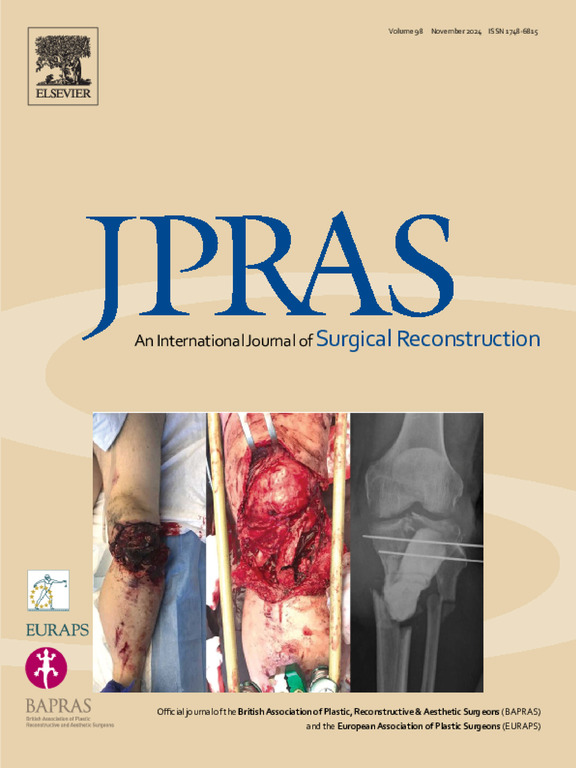自体乳房重建后的睡眠质量
IF 2
3区 医学
Q2 SURGERY
Journal of Plastic Reconstructive and Aesthetic Surgery
Pub Date : 2024-09-19
DOI:10.1016/j.bjps.2024.09.035
引用次数: 0
摘要
背景睡眠是人类健康和幸福的一个基本方面,但在医院环境中却经常被打断。尤其是在手术后,睡眠质量差会对术后恢复和生活质量产生负面影响。因此,本研究旨在深入了解自体乳房再造术后患者的睡眠质量,并评估与睡眠质量相关的因素。材料与方法在这项单中心观察性队列研究中,参与者在手术前、入院期间、术后两周和三个月完成了睡眠日记,包括匹兹堡睡眠质量指数(PSQI)和EQ-5D-5L生活质量问卷。此外,还收集了疼痛和麻醉持续时间等其他变量。手术前,58%的患者睡眠质量不佳,PSQI 中位数为 5.0 分。入院期间,83%的患者睡眠质量差,PSQI 得分为 6.0。术后两周的 PSQI 分数上升到 7.0,术后三个月下降到 5.0。在前面提到的所有术后时间点上,疼痛评分为 >4("疼痛 "组)的患者的 PSQI 中位数均高于疼痛评分≤4("无痛 "组)的患者。结论大多数女性在自体乳房再造术后睡眠质量不佳,尤其是术后疼痛评分较高的女性。这些知识为改善此类患者的术后护理提供了机会。本文章由计算机程序翻译,如有差异,请以英文原文为准。
Sleep quality after autologous breast reconstruction
Background
Sleep is a fundamental aspect of human health and well-being, but is often interrupted in a hospital setting. Especially after surgery, poor sleep quality can negatively affect postoperative recovery and quality of life. Therefore, the aim of this study was to gain insights into the quality of sleep in patients after autologous breast reconstruction and evaluate factors associated with the quality of sleep.
Materials and methods
In this single-center observational cohort study, participants completed a sleep diary, including the Pittsburgh sleep quality index (PSQI) and EQ-5D-5L quality of life questionnaire, before surgery, during hospital admission, and two weeks and three months postoperative. Additional variables such as pain and anesthesia duration were collected.
Results
Twenty-nine patients were included. Before the surgery, 58% of them experienced poor quality of sleep, with a median PSQI score of 5.0. During hospital admission, 83% of the patients had poor quality of sleep, with a PSQI score of 6.0. The PSQI score two weeks postoperative increased to 7.0 and decreased three months postoperative to 5.0. Patients with pain scores >4 (“pain” group), had higher median PSQI scores than patients with pain scores ≤4 (“no pain” group) at all postoperative time points previously mentioned. No correlation was observed between anesthesia duration or quality of life.
Conclusion
Poor sleep quality was experienced by most women after autologous breast reconstruction, especially in those with higher postoperative pain scores. This knowledge offers an opportunity to improve the postoperative care for such patients.
求助全文
通过发布文献求助,成功后即可免费获取论文全文。
去求助
来源期刊
CiteScore
3.10
自引率
11.10%
发文量
578
审稿时长
3.5 months
期刊介绍:
JPRAS An International Journal of Surgical Reconstruction is one of the world''s leading international journals, covering all the reconstructive and aesthetic aspects of plastic surgery.
The journal presents the latest surgical procedures with audit and outcome studies of new and established techniques in plastic surgery including: cleft lip and palate and other heads and neck surgery, hand surgery, lower limb trauma, burns, skin cancer, breast surgery and aesthetic surgery.

 求助内容:
求助内容: 应助结果提醒方式:
应助结果提醒方式:


